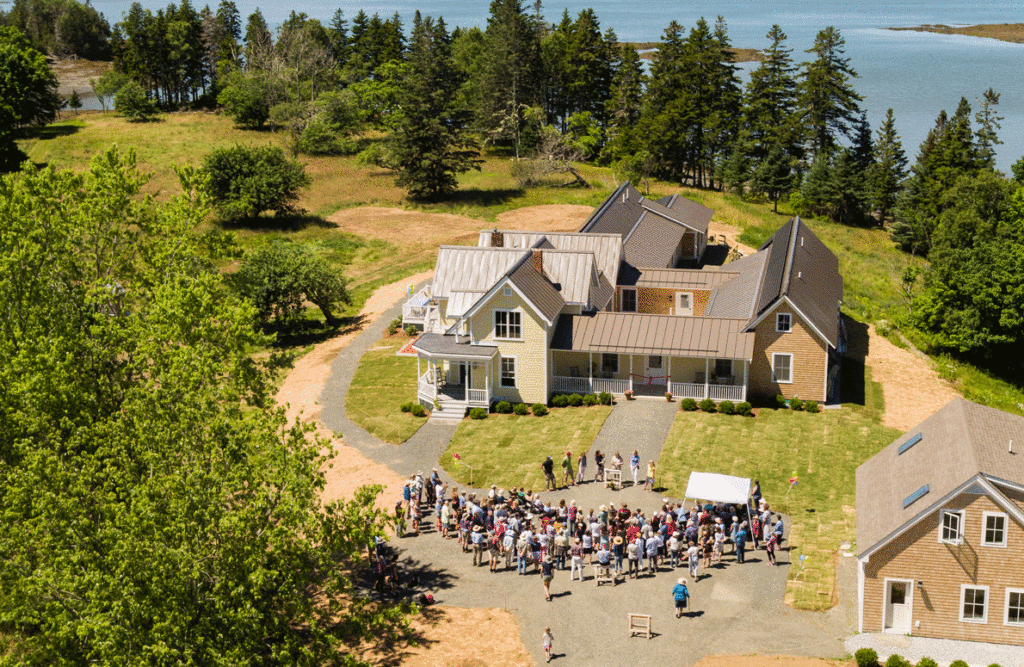Here’s an idea that most would agree with—our elders should be able to age in place. But making this happen on an island or in a remote community is an altogether more difficult challenge than it is where I grew up on the east side of Cleveland.
My Grandpa Frank is 100 and lives an independent life, still in his home, still driving and caring for himself. I am incredibly grateful for this man. He has meant the world to me and been a guiding star my whole life. He has beat the odds by a long shot. But if he were to get sick tomorrow, he could stay in his community and move to one of a number of facilities that would provide him with the care that he needs next.
Elders on islands, though, often must be moved to the mainland. As someone said to me recently, “You might as well be moving them to another state.”
A few Maine islands have grappled with this challenge—Chebeague, Vinalhaven, and Islesboro. Most recently, the indefatigable Lindsey Beverage of North Haven who, as a member of one of the island’s most deeply rooted families, wished her relatives didn’t have to leave in old age. That wish became her vision for Southern Harbor Eldercare services.
A few years ago, I heard Lindsey bravely tell a room full of people that she was committed to solving the aging-in-place problem for North Haven. She was speaking to islanders participating in the Island Institute’s leadership program, Island Sustainability through Leadership and Entrepreneurship, or ISLE.
Today, when you drive up to the Southern Harbor House on North Haven, you have no idea you are going to be visiting an elder care facility. On a slight rise at the end of long drive is the beautiful yellow home with a porch, surrounded by playgrounds and orchards.
I stood in the audience among friends and neighbors to celebrate the ribbon-cutting for the home. I suspect more than a few of those in the audience were looking at the home from more than a casual perspective—they might someday be residents. A number of summer visitors commented that they might switch residency in order to try to spend their old age in the home.
How does one move from a vision to such a beautiful outcome in just three years? Speakers made it clear how completely the community had pulled together behind Lindsey’s vision.
A key to the success was the donation of the house itself. The story goes that a seasonal resident who had been traveling in Jordan was reading the news of North Haven and came across Lindsey’s essay on the need for an elder care facility. The woman had a home to donate but an organization didn’t yet exist to take the gift. In stepped North Haven Sustainable Housing—a phenomenal group of island leaders who care passionately about maintaining workforce housing in the community.
The housing group became the fiscal agent and developer for the project. The land surrounding the home was put into an easement held by North Haven Conservation Partners. Off the island, the group benefited tremendously from the expertise of Genesis Community Loan Fund, and the Maine Seacoast Mission assisted through its island elder care network.
Other partners include North Haven Community School, which helped with student community service work. Some elementary school classes will place a weather station at the house, and it is hoped that residents of the Southern Harbor house will interact with Waterman’s Community Center, the church, and historical society for activities for residents.
Commercial partners included two general contractors, lots of subs, and ReVision Energy partnered in installing a solar array (the facility pays 50 percent of the cost of the hardware and ReVision gets the tax credits and depreciation and, in six years, the facility buys the panels at half price and enjoys free power).
And of course, there were many partnerships between donors and volunteers—generous year-round and summer donors, people who pitched in with their hands to help, and the many who donated items that were needed.
It is hard work to go from a vision to implementation on such an aggressive timeline. It took all of these partnerships and all the passion the community could muster to pull this off, and in the end, they made a place for elders on the island. I was glad to be there to celebrate with the community. It is an incredible accomplishment—one that shows how committed North Haven is to its own future, and to maintaining its culture.
Rob Snyder is president of the Island Institute, publisher of The Working Waterfront. Follow Rob on Twitter @ProOutsider.





